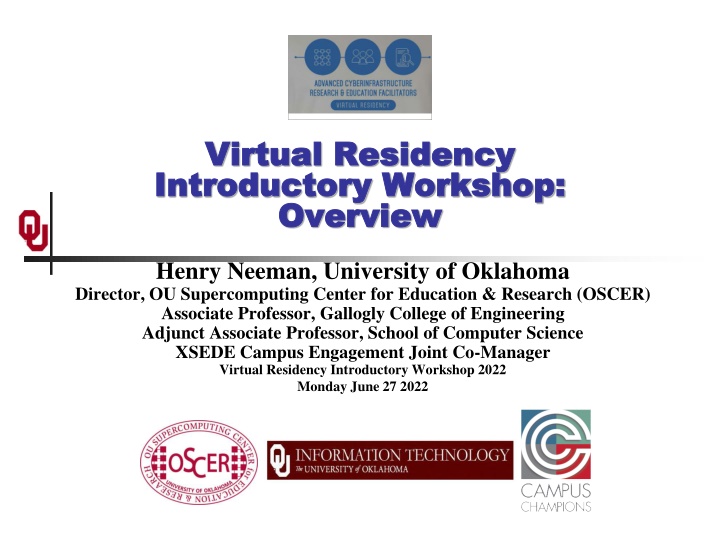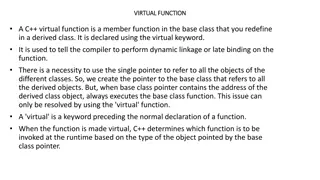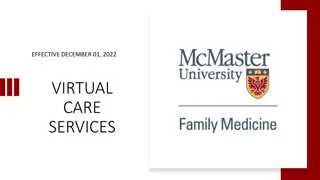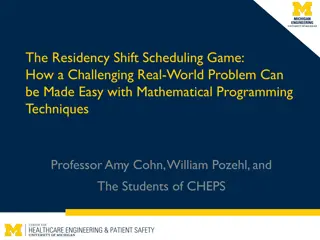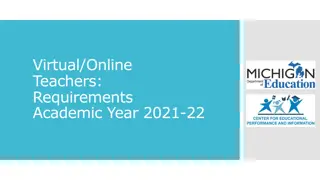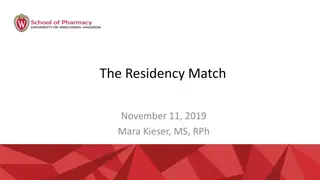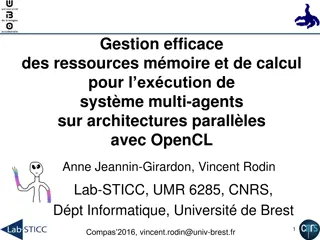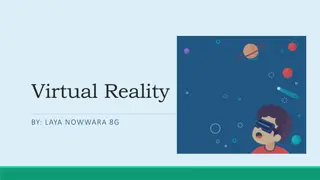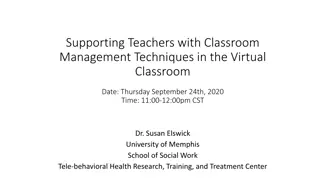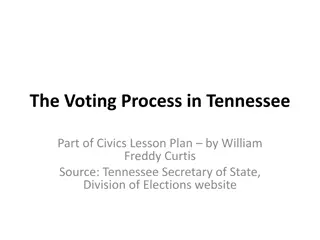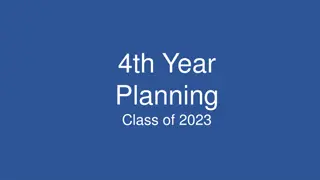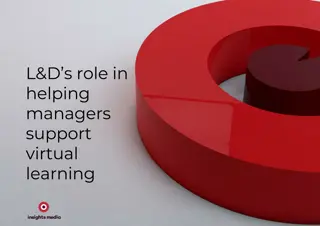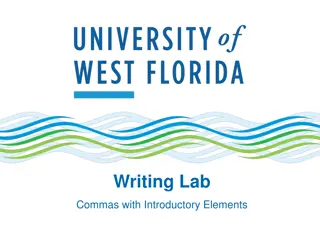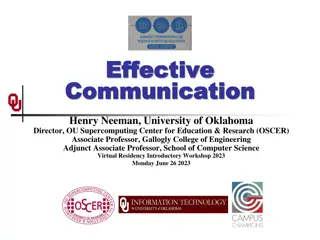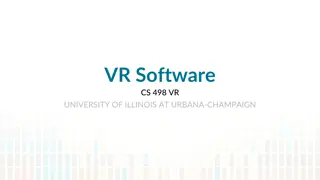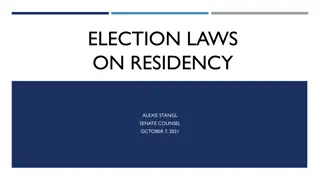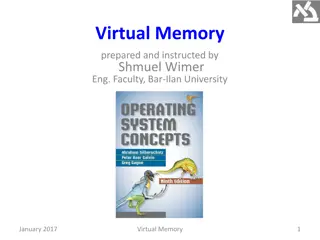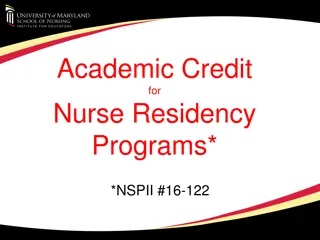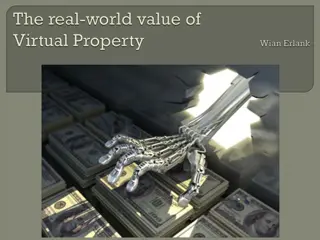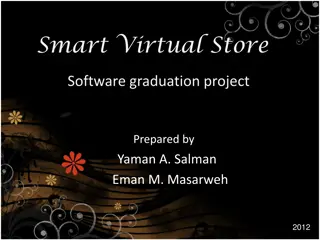Virtual Residency Introductory Workshop: Overview
Join the Virtual Residency Workshop with Henry Neeman from the University of Oklahoma for an in-depth overview on supercomputing, education, and research. Get insights on Zoom videoconferencing, workshop materials, and how to participate in this informative session.
Download Presentation

Please find below an Image/Link to download the presentation.
The content on the website is provided AS IS for your information and personal use only. It may not be sold, licensed, or shared on other websites without obtaining consent from the author.If you encounter any issues during the download, it is possible that the publisher has removed the file from their server.
You are allowed to download the files provided on this website for personal or commercial use, subject to the condition that they are used lawfully. All files are the property of their respective owners.
The content on the website is provided AS IS for your information and personal use only. It may not be sold, licensed, or shared on other websites without obtaining consent from the author.
E N D
Presentation Transcript
Virtual Residency Virtual Residency Introductory Workshop: Introductory Workshop: Overview Overview Henry Neeman, University of Oklahoma Director, OU Supercomputing Center for Education & Research (OSCER) Associate Professor, Gallogly College of Engineering Adjunct Associate Professor, School of Computer Science XSEDE Campus Engagement Joint Co-Manager Virtual Residency Introductory Workshop 2022 Monday June 27 2022
Workshop Webpage & E-mail Workshop webpage: http://www.oscer.ou.edu/virtualresidency2022/ All materials will be posted here, including slides (if any), links to Google Docs for each session, and links to streaming video recordings of the sessions (afterwards). Workshop e-mail address: virtualresidency2022@gmail.com If you have questions, sending them to this e-mail address means that they ll get auto-forwarded to Henry. Virtual Residency Intro Workshop Overview Virtual Residency Workshop 2022, Mon June 27 2
Zoom Videoconferencing Zoom is compatible with Windows, MacOS, Linux, iOS and Android. If you can t use the Zoom app, you can use your phone for audio-only (but video+audio is better). Slides will be posted on the workshop webpage, but we can t guarantee that they ll always be posted before they re used. We hope to be able to post streaming video of all sessions after each session, but we don t know how long the lag will be (probably hours, hopefully by the next day: auto-captioned). Please MUTE YOURSELF except when you're talking. http://www.oscer.ou.edu/virtualresidency2022/ virtualresidency2022@gmail.com Virtual Residency Intro Workshop Overview Virtual Residency Workshop 2022, Mon June 27 3
Zoom: Video+Audio General You MUST have a Zoom account. You can get a FREE Zoom Basic account at: http://zoom.us/ In your Zoom account, please use either (a) your full name or (b) your first name and institution, for reporting to the NSF. Please update Zoom to the most recent stable version. Windows, MacOS or Linux: In a web browser, go to the Zoom URL we sent you via e-mail. That will get you a download of the Zoom app for your OS. Android or iOS: Go to your app store and download the FREE Zoom app. Run the Zoom app and go to the meeting ID number in the e-mail. Please MUTE YOURSELF except when you're talking. http://www.oscer.ou.edu/virtualresidency2022/ virtualresidency2022@gmail.com Virtual Residency Intro Workshop Overview Virtual Residency Workshop 2022, Mon June 27 4
Phone: Audio Only, USA For audio only via phone, from inside the USA: On any USA phone, dial one of the following USA toll numbers: 720-928-9299 US toll (Denver) 971-247-1195 US toll (Portland) 213-338-8477 US toll (Los Angeles) 253-215-8782 US toll (Tacoma) 346-248-7799 US toll (Houston) 602-753-0140 US toll (Phoenix) 669-219-2599 US toll (San Jose) 301-715-8592 US toll (Washington DC) Use the session ID number and numeric password in the e-mail. Please e-mail hneeman@ou.edu with your name, institution and phone number, so that we can properly track and report how many people attended from each institution. NOTE: NO TOLL-FREE telephone audio-only option for remote attendees inside or outside the USA. Please MUTE YOURSELF except when you're talking. http://www.oscer.ou.edu/virtualresidency2022/ virtualresidency2022@gmail.com Virtual Residency Intro Workshop Overview Virtual Residency Workshop 2022, Mon June 27 312-626-6799 US toll (Chicago) 470-250-9358 US toll (Atlanta) 470-381-2552 US toll (Atlanta) 646-518-9805 US toll (New York) 646-876-9923 US toll (New York) 651-372-8299 US toll (Minnesota) 786-635-1003 US toll (Miami) 267-831-0333 US toll (Philadelphia) 5
Phone: Audio Only, Non-USA For audio only via phone, from outside the USA: Open a web browser and go to: https://zoom.us/zoomconference?m=GBPzosolPR18D5S7Ig55m6KM95W8UxEF Find your country and call that TOLL number (NO TOLL-FREE). Use the meeting ID and numeric password in the e-mail. Please e-mail hneeman@ou.edu with your name, institution and phone number, so that we can properly track and report how many people attended from each institution. NOTE: NO TOLL FREE telephone audio-only option for remote attendees inside or outside the USA. Please MUTE YOURSELF except when you're talking. http://www.oscer.ou.edu/virtualresidency2022/ virtualresidency2022@gmail.com Virtual Residency Intro Workshop Overview Virtual Residency Workshop 2022, Mon June 27 6
Zoom: Camera Off, Mic Muted If you re on Zoom, please keep your CAMERA OFF EXCEPT(optionally) when you re asking a question: Some of our attendees have limited bandwidth for Zoom, so having extra movement on the screen may slow down or even crash their Zoom connection. If you re on Zoom or on the phone, please keep your MICROPHONE MUTED except when asking a question. Remember, there are lots of you (hundreds total, typically more than a hundred at a time). If you forget to mute your camera and/or microphone, we will mute you. If you keep turning those back on unnecessarily, we will kick you off. Virtual Residency Intro Workshop Overview Virtual Residency Workshop 2022, Mon June 27 7
Outline This is an experiment! CI Facilitators Virtual Residency Background National Science Foundation s Campus Cyberinfrastructure Programs Why Enterprise IT Approaches to Training Won t Work for CI Professionals Virtual Residency Virtual Residency Workshop 2022 CCIFTD: Certified CI Facilitator Training & Development You re Next Virtual Residency Intro Workshop Overview Virtual Residency Workshop 2022, Mon June 27 8
This is an Experiment! Four of this week s sessions, and some of the material in the longstanding sessions, are exciting and new. Those of you who are new are the 8th cohort of what has become a national program. This means that you re helping us to pioneer a new way of developing the next generation Cyberinfrastructure (CI) workforce. http://www.oscer.ou.edu/virtualresidency2022/ virtualresidency2022@gmail.com Virtual Residency Intro Workshop Overview Virtual Residency Workshop 2022, Mon June 27 10
Only You can make the Virtual Residency a success. Ask questions the only dumb questions are the ones you don t ask. Volunteer your ideas and experiences. Ultimately, it s you who will have to be in charge, not us. http://www.oscer.ou.edu/virtualresidency2022/ virtualresidency2022@gmail.com Virtual Residency Intro Workshop Overview Virtual Residency Workshop 2022, Mon June 27 11
This Is So New, We Dont Know How to Teach It For the Introductory workshop sessions (2015-17, 2019, 2021-22), we were able to find speakers for most of the topics we covered. For Intermediate and Advanced topics, very few of the topics are issues that any of us know enough about to be able to teach to others at the Intermediate or Advanced level. So, most of the Intermediate and Advanced sessions are panels we ll learn from each other! http://www.oscer.ou.edu/virtualresidency2022/ virtualresidency2022@gmail.com Virtual Residency Intro Workshop Overview Virtual Residency Workshop 2022, Mon June 27 12
What is a CI Facilitator? Advanced Cyberinfrastructure Research & Education Facilitator (ACI-REF term coined by Miron Livny) Work with users researchers and educators to help them improve their research and/or education productivity and aspirations via advanced Cyberinfrastructure (CI). Typically, one or a few CI Facilitators have responsibility for an entire institution, or even multiple institutions. At some institutions, CI Facilitation is part time; at others, it s full time. Some CI Facilitators are or used to be: faculty (current or former); postdocs (current or former); research staff (current or former); IT professionals, including from Enterprise IT (current or former); graduate or undergraduate students (current or former). Virtual Residency Intro Workshop Overview Virtual Residency Workshop 2022, Mon June 27 14
The Five Facings Researcher-facing (e.g., CI Facilitator) System-facing (e.g., cluster sysadmin) Data-facing (e.g., Research Data Librarian) Software-facing (e.g., Research Software Engineer) Strategy/policy-facing (e.g., institutional CI leader) Virtual Residency Intro Workshop Overview Virtual Residency Workshop 2022, Mon June 27 15
What is a CI Facilitator NOT? A CI Facilitator is NOT NECESSARILY a computer scientist in fact, many (most?) CI Facilitators come from non-CS disciplines. A CI Facilitator is NOT NECESSARILY a sysadmin in fact, many CI Facilitators have little or no system-facing role). A CI Facilitator is NOT NECESSARILY a current or former researcher though many are. A CI Facilitator is NOT NECESSARILY an IT professional in fact, most CI Facilitators aren t IT professionals, though many are. Virtual Residency Intro Workshop Overview Virtual Residency Workshop 2022, Mon June 27 16
What Do CI Facilitators Do? #1 Cyberinfrastructure (CI) Facilitators are CI professionals who work directly with Science, Technology, Engineering and Mathematics (STEM) and non-STEM researchers, scholars (e.g., humanities) and creatives (e.g., arts), to advance the computing-intensive/data-intensive aspects of their research/scholarship/creative activity. Virtual Residency Intro Workshop Overview Virtual Residency Workshop 2022, Mon June 27 17
What Do CI Facilitators Do? #2 CI Facilitation amplifies researcher productivity via: adapting researcher workflows to CI systems (e.g., supercomputers, clouds, storage) and teaching how to use these systems; bridging between researchers and technology experts; anticipating new CI needs for emerging research activities (e.g., GPUs for machine learning); helping STEM researchers with limited coding experience to design use-case-specific software and to port to advanced architectures; teaching research cybersecurity and compliance (e.g., HIPAA for grants); Virtual Residency Intro Workshop Overview Virtual Residency Workshop 2022, Mon June 27 18
What Do CI Facilitators Do? #3 CI Facilitation amplifies researcher productivity via (cont d): developing strategies for specific use cases; teaching data management; providing local and national training opportunities (e.g., Software Carpentry workshops for novice CI skills); helping researchers evaluate technology solutions; recruiting new users and new use cases; researcher advocate to central administration; preparing CI-focused portions of publications, posters, etc; composing CI text for grant proposals. Virtual Residency Intro Workshop Overview Virtual Residency Workshop 2022, Mon June 27 19
Who Cares About CI Facilitators? #1 Researchers: They find us incredibly helpful! National leadership: The National Cyberinfrastructure Coordination Service Conference report recommends the following: Incentivize the development of new/ongoing efforts that bring together CI professionals to learn from one another and generate community efforts to identify and improve leading practices. https://www.rti.org/publication/national-cyberinfrastructure-coordination-service-conference Virtual Residency Intro Workshop Overview Virtual Residency Workshop 2022, Mon June 27 21
Who Cares About CI Facilitators? #2 Similarly, the National Science Foundation s CI 2030 report states: NSF should develop mechanisms to support teaming of scientists and engineers with ... [CI] professionals to ensure that science and engineering [research] benefits from future advances in ... [CI] .... The skill and knowledge needed to use ... [CI] is very advanced and beyond the reach of most domain scientists. Professionals with [CI] expertise are in very short supply and there is an increasing need for bridge technologists ... with enough domain expertise to understand research requirements and enough technical [CI] expertise to ... develop/apply the right [CI] solutions. Skills development, reliable funding sources, and rewarding career paths are desperately needed for such individuals. https://www.nsf.gov/cise/oac/ci2030/ Virtual Residency Intro Workshop Overview Virtual Residency Workshop 2022, Mon June 27 22
Growth in CI Facilitators Participating Individuals (top) and Institutions (bottom) in Campus Champions, the Virtual Residency and the CaRCC Researcher-Facing group, 2008-19. Virtual Residency Intro Workshop Overview Virtual Residency Workshop 2022, Mon June 27 23
Virtual Residency Background
A Little Background In 2013, a team of 13 institutions led by Clemson U submitted an 8-figure proposal on this issue, to provide multiple CI Facilitators at each institution over a 4 year period. http://www.aciref.org/wp-content/uploads/2014/04/map.png The proposal also included funding for advanced networking. Virtual Residency Intro Workshop Overview Virtual Residency Workshop 2022, Mon June 27 25
OUs Piece OU s piece included some extra components: A Virtual Residency to teach how to be a CI Facilitator THIS! A component about EPSCoR jurisdictions, shared with HI, SC and UT (note that UT has now graduated from EPSCoR): EPSCoR: Established (formerly Experimental) Program for the Stimulation of Competitive Research: a federal program to promote and increase STEM research in states that get less than 0.75% of federal research funding. NSF, Dept of Energy, Dept of Defense, NASA NIH (known as INBRE) Virtual Residency Intro Workshop Overview Virtual Residency Workshop 2022, Mon June 27 26
Ah, if only . Unfortunately, the NSF wasn t able to fully fund that proposal. The team ended up reducing down to 6 institutions for 2 years, and no advanced networking. NOTin Phase 1: Arizona State U Emory U Ohio Supercomputer Center Stanford U Sunshine State Education & Research Computing Alliance (SSERCA) U Oklahoma U Washington Phase 1: Clemson U Harvard U U Hawai i U Southern California U Utah U Wisconsin Madison Virtual Residency Intro Workshop Overview Virtual Residency Workshop 2022, Mon June 27 27
National Science Foundation s Campus Cyberinfrastructure Programs
And then In 2012-13, the NSF had a program called Campus Cyberinfrastructure - Networking Infrastructure & Engineering (CC-NIE). Two subprograms: One for deploying networking equipment, one for innovative networking research. OU, OSU, Oklahoma Innovation Institute, Langston U, OneNet: OneOklahoma Friction Free Network In 2014, that was followed by Campus Cyberinfrastructure - Infrastructure, Innovation & Engineering (CC*IIE). Several new subprograms, including Campus CI Engineer. Since then, the same program has had various names, but always starting with Campus Cyberinfrastructure (CC*). Virtual Residency Intro Workshop Overview Virtual Residency Workshop 2022, Mon June 27 29
So In 2014, OU submitted a Campus CI Engineer proposal: A Model for Advanced Cyberinfrastructure Research and Education Facilitators $400K Highlighted the relationship between OU and the ACI-REF project. We put Clemson s Phase 1 PI on our External Advisory Committee. OU was the only institution that was all of: Former ACI-REF Phase 1 (so already involved) EPSCoR (and was to have co-led the ACI-REF EPSCoR thrust) CC* equipment awardee (so needed a Campus CI Engineer already) Virtual Residency Intro Workshop Overview Virtual Residency Workshop 2022, Mon June 27 30
Objectives Data-Intensive Research Facilitation: Via Software Defined Networking (SDN) across OFFN, facilitate end-to-end management, by researchers, of high bandwidth/high performance data flows through a distributed hierarchy of open standards tools, providing researchers with a new layer of transparency into network transport at OU, among OneOCII institutions, and with ACI-REF members. Oklahoma ACI-REF project: Lead and facilitate adoption of the ACI-REF approach across Oklahoma, leveraging extant and emerging capabilities within OneOCII. National training regime: Provide a virtual residency program for Campus CI Engineers and other ACI-REFs, open to not only CC*IIE awardees and ACI-REF members but any institution that needs. Research Experiences for Undergraduates (REU) Sites/Supplements: Foster undergraduate research at OU via a culture of integrating REU sites and supplements into Science, Technology, Engineering & Mathematics (STEM) research, including by all research themes on this proposed CC*IIE project. Virtual Residency Intro Workshop Overview Virtual Residency Workshop 2022, Mon June 27 31
Success! Reviewer comments This energetic, detailed and ambitious proposal from the University of Oklahoma deserves the highest priority for support. There are no major weaknesses in the proposal and many strengths. The broader impacts are nicely defined in terms of the idea of a residency program . A residency program and enhancement of undergraduate research are strong enhancements to the proposal. This is one of the better proposals regarding additional outreach via the budgeted virtual residency program. [Emphasis added.] Virtual Residency Intro Workshop Overview Virtual Residency Workshop 2022, Mon June 27 32
Even More Success! From a review from the Clemson-led Research Coordination Network grant that created the Campus Research Computing Consortium (CaRCC), regarding broader impacts: The ACI-REF virtual residency held at OU Supercomputing Center may be notable (the web site s description of the workshop looked outstanding) assuming it was available to a broader community and not just the [Phase 1] awardees. 2015: 49 of 50 participants (98%), from 37 of 38 institutions (97%), were not just the [Phase 1] awardees. 2016: 90 of 99 participants (91%), from 60 of 66 institutions (91%), were not just the [Phase 1] awardees. 2017: 186 of 196 participants (95%), from 128 of 134 institutions (96%), were not just the [Phase 1] awardees. 2018: 210 of 216 participants (97%), from 144 of 147 institutions (98%), were not just the [Phase 1] awardees. 2019: 249 of 254 participants (98%), from 161 of 164 institutions (98%), were not just the [Phase 1] awardees. 2020: 400 of 430 participants (93%), from 219 of 225 institutions (97%), were not just the [Phase 1] awardees. 2021: 339 of 347 participants (98%), from 187 of 191 institutions (98%) were not just the [Phase 1] awardees. Virtual Residency Intro Workshop Overview Virtual Residency Workshop 2022, Mon June 27 33
Why Enterprise IT Why Enterprise IT Approaches to Approaches to Training Won t Work Training Won t Work for CI Professionals for CI Professionals
Enterprise IT Training Wont Work Enterprise IT: Millions of professionals 1970: 0.45M (0.6% of US civilian workforce) 2014: 4.6M (2.9%) Compound Annual Growth Rate: 5.3% (doubles every 13 years) Degree programs (AS, BS, MS, PhD, certificates) Certifications (e.g., CISSP, RHCE, MCSE, etc) Enormous resources devoted to constantly updating skills NOTE: This DOESN T take into account the explosion of data science degree programs in the late 2010s. Research Computing: Thousands of professionals No degree programs No certifications Minimal resources for updating skills Therefore, informal education is our best bet like this! Virtual Residency Intro Workshop Overview Virtual Residency Workshop 2022, Mon June 27 https://www.census.gov/content/dam/Census/library/publications/2016/acs/acs-35.pdf 35
Virtual Residency: What? We teach pre-service and in-service CI Facilitators how to do (or do better) Research Computing Facilitation. But then we have a hidden secret agenda . Virtual Residency Intro Workshop Overview Virtual Residency Workshop 2022, Mon June 27 37
Virtual Residency: How? Annual weeklong summer workshop (since 2015) U California System has run its own targeted workshop based on our introductory workshop, in spring 2017 and spring 2018. Virtual Residency workshop planning calls Annual meeting at the SC supercomputing conference 2017-18, 18-19, 19-20, 20-21: Grant Proposal Writing Apprenticeship (now in hiatus due to getting the grant) 2018-19, 19-20, 20-21, 21-22: Paper Writing Apprenticeship (PEARC 19, PEARC 20, PEARC 21 papers published) 2021-22: Grant Running Apprenticeship (CCIFTD grant) Before the Virtual Residency, no one had ever been dumb enough to try to teach this stuff. Virtual Residency Intro Workshop Overview Virtual Residency Workshop 2022, Mon June 27 38
Virtual Residency: Why? CI Facilitators have strong experience within their discipline (often non-CS). Most CI Facilitators (and other CI pros) haven t been faculty. Sometimes little or no research experience (especially for IT staff who have an enterprise IT background). Even if strong research background, typically little or no experience with research outside their own discipline. When we started the Virtual Residency in 2015, there were no local, regional or national programs to teach people how to be a CI Facilitator. In the olden days, you could take your time learning how to do this but not anymore . Virtual Residency Intro Workshop Overview Virtual Residency Workshop 2022, Mon June 27 39
Virtual Residency: Who? 2015-present (before this week): We ve already served 1159 people from 426 institutions in all 50 US states & 4 US territories, plus 14 other countries on 5 continents, including: 65 (15%) Minority Serving Institutions (17% of 379 bachelor-granting MSIs, 10% of 654 MSIs); 114 (27%) non-PhD-granting institutions; 117 institutions (26%) in all 28 EPSCoR jurisdictions; 272 institutions (64%) are Campus Champion institutions (77% of Campus Champion institutions). This is for ALL Virtual Residency activities, including: workshops (including mini-workshops by/for U California); conference calls; the Apprenticeships (Grant Proposal Writing, Paper Writing, Grant Running). Virtual Residency Intro Workshop Overview Virtual Residency Workshop 2022, Mon June 27 40
Virtual Residency: Whos Here? We can t yet say who s attending this week s workshop, but we can say who s preregistered: 510 preregistrants (2021: 538; 2020: 582; 2019: 334; 2018: 312; 2017: 257) 234 preregistered institutions, from 46 US states, 3 US territories and 12 other countries on 6 continents, including: 31 Minority Serving Institutions (13% of this year s institutions), 55 non-PhD-granting institutions (24%), 65 institutions (28%) in 22 of 28 (79%) EPSCoR jurisdictions, 156 Campus Champion institutions (67%). Based on past experience, we expect far fewer attendees than preregistrants. Virtual Residency Intro Workshop Overview Virtual Residency Workshop 2022, Mon June 27 41
Why is Helping Researchers Hard? Ubiquity: Within any discipline, a greater proportion of researchers do computing-intensive and/or data-intensive research now than ever before. Applicability: More disciplines do computing-intensive and/or data-intensive research now than ever before. System Complexity: The storage hierarchy is getting deeper (flash, non-volatile RAM etc), and parallelism is getting more hybrid (GPUs etc). Conceptual Distance: The mental gap from handheld computing to command line/Linux/batch/remote/shared. But we still only have one hour to teach them how to use CI before they lose interest! Virtual Residency Intro Workshop Overview Virtual Residency Workshop 2022, Mon June 27 42
More Institutions Have On-Premise CI The fraction of national universities that have on-campus research computing resources: 128 of 131 R1s (Carnegie Classification Very High Research Activity); 79 of 135 R2s (High Research Activity); all of the top 20 institutions (US News rankings); all but one of the top 50; all but three of the top 100; all but 23 of the top 150; all but 38 of the top 200. Virtual Residency Intro Workshop Overview Virtual Residency Workshop 2022, Mon June 27 43
Most Institutions Have Virtual Residents #1 The fraction of US News national universities that have participated in, or are registered to participate in, the Virtual Residency (percentages due to ties in the last position): all but one of the top 10 institutions (91%); all but one of the top 25 (96%); 51 of the top 50 (94%); 72 of the top 75 (92%); 89 of the top 100 (87%); 129 of the top 150 (80%); 151 of the top 200 (76%); 179 of the top 250 (68%). https://www.usnews.com/best-colleges/rankings/national-universities Virtual Residency Intro Workshop Overview Virtual Residency Workshop 2022, Mon June 27 44
Most Institutions Have Virtual Residents #2 The fraction of R1 and R2 universities that have participated in, or are registered to participate in, the Virtual Residency: R1: 127 of 131 (97%); R2: 88 of 135 (65%). Virtual Residency Intro Workshop Overview Virtual Residency Workshop 2022, Mon June 27 45
Virtual Residency Evaluation For the 2020 workshop, we did an external evaluation of the Virtual Residency workshop. Georgia Tech Institutional Review Board protocol # H16227, approved 6/30/2016, approved for use at OU by OU s IRB 5/13/2022. The evaluation was conducted by the same team that does the evaluation for the XSEDE program, led by Lizanne DeStefano and Lorna Rivera. We presented a paper with the results of the evaluation at PEARC 21. Virtual Residency Intro Workshop Overview Virtual Residency Workshop 2022, Mon June 27 46
Workshop 2020 Demographics Gender VRP Women: 30% US Population: 51% (VRP = 59% of US population) All Computing/IT Occupations: 26% (VRP = 115% of CS/IT) SC15-17: 13-14% (VRP = 200+% of recent SC conferences) Race/Ethnicity VRP Underrepresented Minorities: 21% US Population: 34% (VRP = 62% of US population) All Computing/IT Occupations: 10% (VRP = 200+% of CS/IT) https://www.census.gov/quickfacts/fact/table/US/PST045219 https://www.bls.gov/cps/cpsaat11.htm http://sc16.supercomputing.org/diversity/index.html https://sc20.supercomputing.org/attend/inclusivity/demographics/ Virtual Residency Intro Workshop Overview Virtual Residency Workshop 2022, Mon June 27 47
Does the Virtual Residency Work? #1 The XSEDE evaluation team (Lorna Rivera, Lizanne DeStefano) have done an evaluation of the 2020 workshop. Sessions were rated 3.90 - 4.42 on a 1 - 5 scale. Effect on underrepresented populations Underrepresented Minorities Experience: Underrepresented minorities rated their experience as 5% MORE SUCCESSFUL than non-URMs rated it (4.76 vs 4.52). Sessions: Underrepresented minorities rated 2 sessions 12% HIGHER than non-URMs rated them (4.71 vs 4.20, 4.71 vs 4.19). Google Docs: Underrepresented minorities rated the Google Docs 13% MORE USEFUL than non-URMs rated them (4.58 vs 4.07) No other statistically significant differences found. Women Sessions: Women rated 1 session 10% LOWER than men (3.85 vs 4.27). No other statistically significant differences found. Virtual Residency Intro Workshop Overview Virtual Residency Workshop 2022, Mon June 27 48
Does the Virtual Residency Work? #2 We assume that y all are plenty busy with other things, so you d only bother to show up if this were worthwhile. As of yesterday (Sun June 26): 338 of 426 Virtual Residency institutions (79%) had participated in multiple Virtual Residency activities; 278 of 426 Virtual Residency institutions (65%) had participated in multiple types of Virtual Residency activities. Virtual Residency Intro Workshop Overview Virtual Residency Workshop 2022, Mon June 27 49
The CI Professional Ecosystem Campus Champions Campus Research Computing Consortium (CaRCC) Coalition for Academic Scientific Computation CyberAmbassadors Linux Clusters Institute SIGHPC Education Chapter The Carpentries Science Gateways Community Institute UK Research Software Engineer Association US Research Software Engineer Association JOIN THESE! Ask us for contact info! US Research Software Sustainability Institute Virtual Residency Intro Workshop Overview Virtual Residency Workshop 2022, Mon June 27 50
